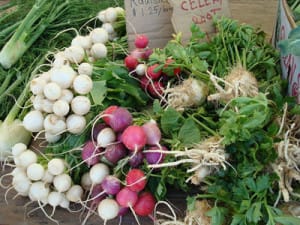The study, led by Newcastle University, will re-ignite debate about the benefits of organic food
The Journal by Tony Henderson
 The largest study of its kind – led by North East experts – has found significant benefits to organic food.
The largest study of its kind – led by North East experts – has found significant benefits to organic food.
An international team led by Newcastle University has shown that organic crops are up to 69% higher in a number of key antioxidants than conventionally-grown crops.
Numerous studies have linked antioxidants to a reduced risk of chronic diseases, including cardiovascular and neurodegenerative diseases and certain cancers.
The study found that a switch to eating organic fruit, vegetable and cereals – and food made from them – would provide additional antioxidants equivalent to eating between one to two extra portions of fruit and vegetables a day.
The study, to be published next week in the prestigious British Journal of Nutrition, also shows significantly lower levels of toxic heavy metals in organic crops.
Cadmium, which is one of only three metal contaminants along with lead and mercury for which the European Commission has set maximum permitted contamination levels in food, was found to be almost 50% lower in organic crops than those conventionally-grown.
The study, funded jointly by the European Framework 6 programme and the Sheepdrove Trust, also found that nitrogen concentrations were significantly lower in organic crops.
Concentrations of total nitrogen were 10%, nitrate 30% and nitrite 87% lower in organic compared to conventional crops. The study also showed that pesticide residues were four times more likely to be found in conventional crops than organic ones.
Carlo Leifert, professor of ecological agriculture at Newcastle University who led the study, said: “The organic versus non-organic debate has rumbled on for decades now but the evidence from this study is overwhelming – that organic food is high in antioxidants and lower in toxic metals and pesticides.
“This demonstrates that choosing food produced according to organic standards can lead to increased intake of nutritionally desirable antioxidants and reduced exposure to toxic heavy metals.
“This constitutes an important addition to the information currently available to consumers which until now has been confusing and in many cases is conflicting.”
The study is the most extensive analysis of the nutrient content in organic versus conventionally-produced foods ever undertaken and is the result of a groundbreaking new systematic literature review and meta-analysis by the Newcastle team.
The findings contradict those of a 2009 UK Food Standards Agency (FSA) commissioned study which found there were no substantial differences or significant nutritional benefits from organic food.
The FSA commissioned study based its conclusions on only 46 publications covering crops, meat and dairy, while the Newcastle analysis is based on data from 343 peer-reviewed publications on composition difference between organic and conventional crops now available.
“The main difference between the two studies is time,” said Prof Leifert. “Research in this area has been slow to take off the ground and we have far more data available to us now than five years ago.”
Dr Gavin Stewart, a lecturer in evidence synthesis and the meta-analysis expert in the Newcastle team, said: “The much larger evidence base available in this synthesis allowed us to use more appropriate statistical methods to draw more definitive conclusions regarding the differences between organic and conventional crops”
Prof Leifert said: “This study should just be a starting point. We have shown without doubt there are composition differences between organic and conventional crops, and now there is an urgent need to carry out well-controlled human dietary intervention and cohort studies specifically designed to identify and quantify the health impacts of switching to organic food.”
The entire database generated and used for this analysis will be freely available on the Newcastle University website (http://research.ncl.ac.uk/nefg/QOF) for the benefit of other experts and interested members of the public.























